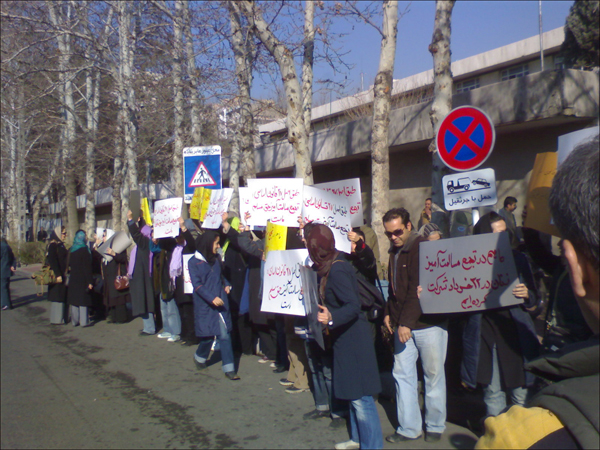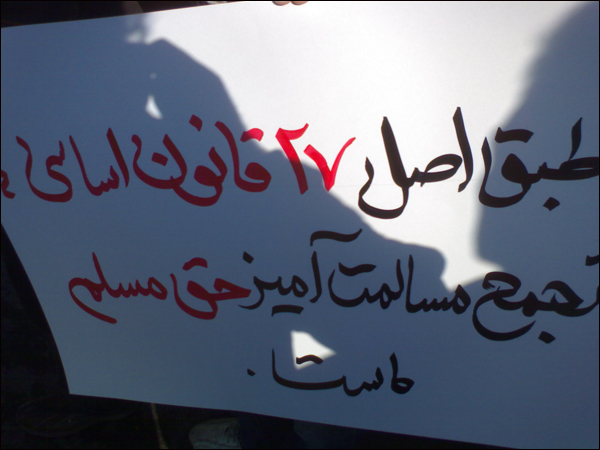We have been working together, our anxieties are the same, and our toddlers are the same ages; now I am in a European country lying on a comfortable bed and she is sleeping in a notorious prison in Iran. She is one of them, one of the 33 women who have been arrested for looking after the basic rights of their female country fellows.
On March 4, more than 33 women were arrested in the capital Tehran. They began a hunger strike on March 6 in Tehran's Evin prison.
Most of the detainees are in good health but some of them are in a bad condition. Parvin Ardalan's multiple sclerosis has worsened. Shahla Entesari, who is kept in solitary confinement, is suffering from high blood pressure. Rezvan Moghaddam has shingles, and her skin is now very painful. The disease is caused by a hidden virus that flares up in situations of high stress. The condition of Mahnaz Ahmadi who was sick before the events has worsened.
Eight of them were released after two days of arrest, but Nasrin Afzali has called her husband, expressing distress because the authorities refuse to bring in a physician. The women who objected were allegedly violently beaten and taken to the criminal's ward of Evin Prison.
They were detained while gathering outside a courthouse to demand a fair trial for five prominent women's rights activists whose court was convening at the same place. The women held up banners outside the revolutionary court, saying: "We have the right to hold peaceful protests."
Background:
The women arrested were protesting about the trial of five women's rights activists who were the organizers of a demonstration last June. The five women have been charged with endangering national security, propaganda against the state, and taking part in an illegal gathering.
The five on trial -- Nusheen Ahmadi Khorasani, Parvin Ardalan, Sussan Tahmasebi, Shahla Entesari, and Fariba Davoodi Mohajer -- have launched a remarkable campaign to collect one million signatures to demand an end to legal discrimination against women under the Islamic law. This legal discrimination includes polygamy and the laws surrounding child custody, and often causes great suffering to women.
Recent studies show many young women in Iran suffer depression and wish to go abroad to escape severe Islamic laws, such as the obligatory hijab.
The campaign is a follow-up project to the June 12, 2006 demonstration for women's rights in Tehran which was violently broken up by the police. Several activists were beaten and 70 people were arrested.
Amnesty International has called for the immediate and unconditional release of the activists. Amnesty believes the arrests may be meant to deter activists from marking International Women's Day on March 8.
The Iranian activists believe these arrests ahead of International Women's day, confirm another crack down on the Iranian women who are active in the struggle to reform Iranian laws that discriminate against women.
Intimidation:
All of the leaders of Iran's women's movement have been detained. When the five women on trial left the courthouse they were arrested too, together with their lawyer.
During the past year, the pressure on women's rights activists has increased in Iran. Women's Web sites are being blocked more than ever, they are prevented from participating in international forums abroad, and they are increasingly summoned to the court, intimidated and detained. When searching the Web one finds that the word "woman" and its equivalent in Persian [Zan] is filtered.
While Iran is the only country in the world where women outnumber men two to one in the universities, a plan is now afoot to limit job and study opportunities for women, which has aroused their ire.
On Feb. 14 three female journalists who campaign for women's rights were arrested without charge in the airport on their way to India to participate in a journalism workshop.
Iranian Women's Movement in a Glance:
The very first women's movement formed as a society in 1907 and was called "Freedom of Women's Society."[Anjoman-e-Azadi-e-Zanan] These women began to establish schools for girls and participated in politics. This is coinciding with the constitutional revolution in Iran; which was the first modern revolution in Iran and in the Middle East, and put an end to feudalism.
The constitutional monarchy system led to a parliament and of course constitutional law in Persia and consequently the women got more strength, establishing publications and paper media.
These societies sometimes expanded but at different periods of time they were also suppressed, particularly after the last revolution in the year 1979.
The women arrested were protesting about the trial of five women's rights activists who were the organizers of a demonstration last June. The five women have been charged with endangering national security, propaganda against the state, and taking part in an illegal gathering.
The five on trial -- Nusheen Ahmadi Khorasani, Parvin Ardalan, Sussan Tahmasebi, Shahla Entesari, and Fariba Davoodi Mohajer -- have launched a remarkable campaign to collect one million signatures to demand an end to legal discrimination against women under the Islamic law. This legal discrimination includes polygamy and the laws surrounding child custody, and often causes great suffering to women.
Recent studies show many young women in Iran suffer depression and wish to go abroad to escape severe Islamic laws, such as the obligatory hijab.
The campaign is a follow-up project to the June 12, 2006 demonstration for women's rights in Tehran which was violently broken up by the police. Several activists were beaten and 70 people were arrested.
Amnesty International has called for the immediate and unconditional release of the activists. Amnesty believes the arrests may be meant to deter activists from marking International Women's Day on March 8.
The Iranian activists believe these arrests ahead of International Women's day, confirm another crack down on the Iranian women who are active in the struggle to reform Iranian laws that discriminate against women.
Intimidation:
All of the leaders of Iran's women's movement have been detained. When the five women on trial left the courthouse they were arrested too, together with their lawyer.
During the past year, the pressure on women's rights activists has increased in Iran. Women's Web sites are being blocked more than ever, they are prevented from participating in international forums abroad, and they are increasingly summoned to the court, intimidated and detained. When searching the Web one finds that the word "woman" and its equivalent in Persian [Zan] is filtered.
While Iran is the only country in the world where women outnumber men two to one in the universities, a plan is now afoot to limit job and study opportunities for women, which has aroused their ire.
On Feb. 14 three female journalists who campaign for women's rights were arrested without charge in the airport on their way to India to participate in a journalism workshop.
Iranian Women's Movement in a Glance:
The very first women's movement formed as a society in 1907 and was called "Freedom of Women's Society."[Anjoman-e-Azadi-e-Zanan] These women began to establish schools for girls and participated in politics. This is coinciding with the constitutional revolution in Iran; which was the first modern revolution in Iran and in the Middle East, and put an end to feudalism.
The constitutional monarchy system led to a parliament and of course constitutional law in Persia and consequently the women got more strength, establishing publications and paper media.
These societies sometimes expanded but at different periods of time they were also suppressed, particularly after the last revolution in the year 1979.




No comments:
Post a Comment